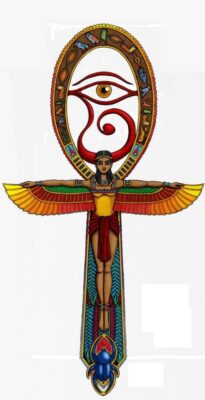
5 Powerful Ankh Gods of Egypt and Their Eternal Symbol
The Ankh Gods of Egypt: A Powerful Symbol of Life and Eternity
The Ankh, often referred to as the “key of life,” is one of the most significant symbols in ancient Egyptian culture. It represents the concept of eternal life and is deeply tied to the gods of Egypt. From Osiris, the god of the afterlife, to Ra, the sun god, the Ankh plays a pivotal role in their stories and powers. This article explores the ankh gods of Egypt, their meanings, and how this ancient symbol shaped beliefs about life, death, and rebirth.
What is the Ankh?
The Ankh is a cross-like symbol with a loop at the top, widely interpreted as the key to eternal life. It’s frequently found in the hands of the gods of Egypt, symbolizing their ability to bestow life upon humans. The Ankh was not just a religious symbol; it held deep spiritual significance, symbolizing the unity of life and death, and it continues to inspire many today.
The Role of the Ankh Gods of Egypt
The gods of Egypt were often depicted with the Ankh, as they held the powers of life and death. These deities played crucial roles in the cosmic cycle of creation and destruction, and the Ankh was their tool to maintain balance. Below, we’ll explore how the most prominent ankh gods of Egypt used this symbol.
1. Osiris – The Ankh and the God of the Afterlife
Osiris, one of the most important ankh gods of Egypt, was the ruler of the afterlife. His death and resurrection are central to Egyptian beliefs about life after death. Depictions of Osiris frequently show him holding an Ankh, symbolizing his control over eternal life and the afterlife. In Egyptian myth, Osiris was resurrected by his wife, Isis, and the Ankh was a powerful representation of this rebirth and renewal.
2. Isis – The Nurturer Among the Ankh Gods of Egypt
Isis, a goddess associated with magic, motherhood, and fertility, was another deity closely linked to the Ankh. She is often seen holding an Ankh in Egyptian art, offering the symbol to Pharaohs or common people as a gift of life. As one of the most beloved ankh gods of Egypt, her nurturing role extended beyond the physical world into the spiritual, where she used the Ankh to protect and give life to both the living and the dead.
3. Horus – The Protector and One of the Major Ankh Gods of Egypt
Horus, the god of the sky and kingship, was often depicted with the Ankh as well. As the son of Osiris and Isis, he continued their legacy of life and protection. When depicted in ancient art, Horus is often seen offering the Ankh to Pharaohs, symbolizing the transfer of divine life force from the gods to the earthly rulers. This made Horus one of the significant ankh gods of Egypt, representing life, kingship, and protection.
- Eye of Horus Tattoo: A Symbol of Protection and Power – (sunpyramid-tours.com)
- The Temple of Horus in Edfu – sun pyramid tours (sunpyramid-tours.com)
The Ankh in Everyday Life
Though the ankh gods of Egypt were the primary bearers of this symbol, the Ankh found its way into the lives of everyday Egyptians. People wore Ankh amulets to invoke protection, health, and a long life. In temples and tombs, the Ankh was carved into the walls to ensure that the deceased would receive eternal life and safe passage into the afterlife.
Why the Ankh Gods of Egypt Matter Today
The ankh gods of Egypt remain symbols of life and continuity, and their connection to the Ankh endures in modern culture. The symbol itself, with its simple yet profound meaning, has crossed time and space, now seen in modern jewelry, art, and spiritual practices. For those who look to ancient Egypt for inspiration, the Ankh remains a reminder of life’s eternal cycle and the mysteries of existence.
Conclusion
The ankh gods of Egypt—Osiris, Isis, Horus, and Ra, to name a few—represent powerful forces of life, death, and rebirth. Through the Ankh, these gods bestowed life upon humans and ensured the continuation of existence beyond the physical world. Whether used in religious ceremonies, art, or funerary practices, the Ankh was a constant reminder that life transcended death. Today, the legacy of the ankh gods of Egypt continues, reminding us of life’s eternal mysteries and the enduring power of ancient symbols.
Recent Posts
Edfu Temple :5 Reasons to Explore the Majestic Today
Discover 7 Amazing Features of Sinbad Hotel Egypt for 2024
Top 7 Reasons to choose Egypt Air Hospital in Egypt
All Categories
Tags

Thailand






